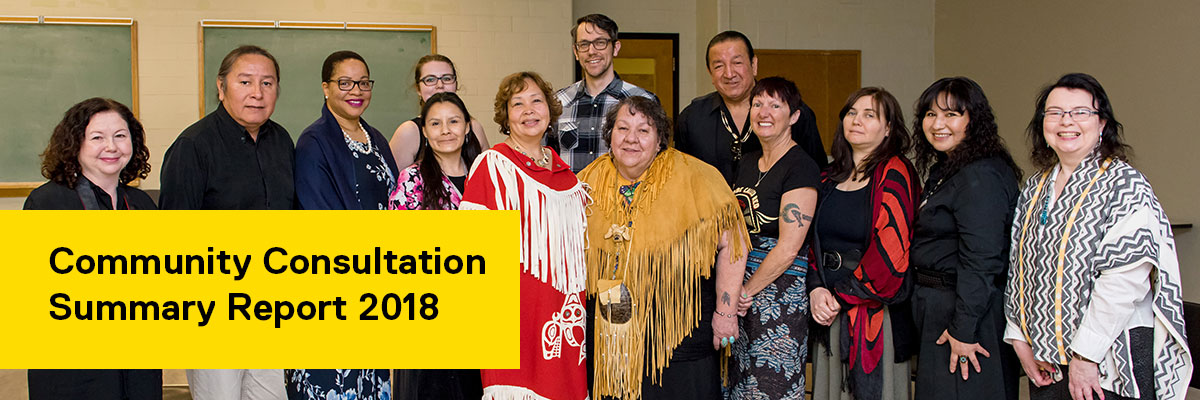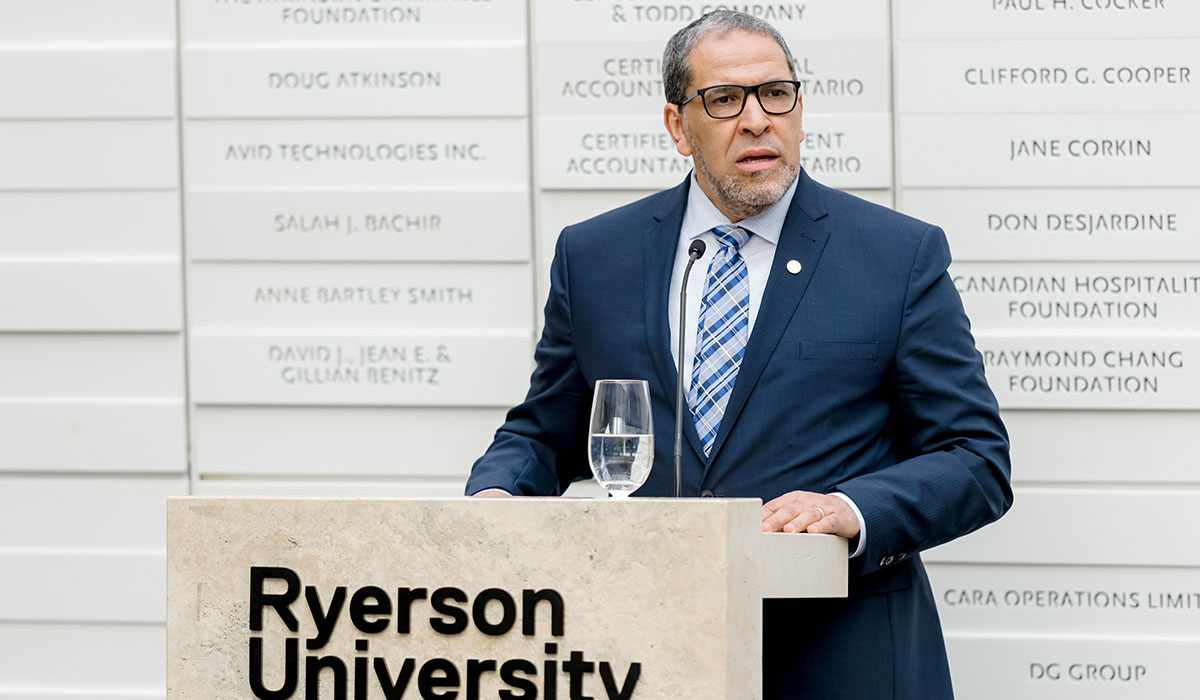Community Consultation Summary Report 2018


This report summarizes our community’s aspirations that were voiced in the talking circles, consultation meetings, events and course projects held at TMU over the past year and a half. While this report concludes the first stage of TMU’s path to reconciliation, it provides the foundation for the next stage of discussions with the entire community and groups on campus, including faculties, departments, unions and governing bodies, on a plan to strategically move forward together.
TMU is overcoming the legacy of a painful past. For years there was a lack of understanding of the concerns of its Indigenous community and little desire to accept responsibility to address these concerns. There was also a reluctance to acknowledge the harmful role played by the University’s namesake. As this report’s authors can readily attest, attitudes are quickly changing. Within the TMU community there is growing recognition of the need to demonstrate respect and understanding of the land the university sits on, and to recognize the cultural knowledge and ways of knowing brought by Indigenous students, staff and faculty.
TMU has committed to respond to the Calls to Action by the Truth and Reconciliation Commission (TRC) of Canada. It is doing so by creating its own pathway to reconciliation. The first stage of this process is now complete. It featured a round of consultations and discussions in which TMU’s Indigenous community played a prominent part. This community consultation report reflects the culmination of the initial stage. It highlights the challenges the university faces, identifies opportunities for change, and outlines a series of suggestions which, if adopted by the TMU community, would ensure that the university expands its recognition and funding for current and new Indigenous initiatives, infuses Indigenous knowledges into the curriculum in all faculties and incorporates Indigenous concerns as a priority in strategic planning.
The benefits that will flow from TMU’s path to reconciliation are important and long-lasting. Already the university has a substantial profile within the Indigenous community of Toronto. In the longer term, it has the opportunity to become a national leader in Indigenous education. Those involved in producing this report believe its recommendations will help bring these aims to fruition. We hope the wider TMU community agrees.

Authors
Dr. Denise O’Neil Green is the Vice-President, Equity and Community Inclusion and provides the leadership, partnerships and strategic direction needed to integrate the values of equity, diversity and inclusion throughout the entire university community.
Joanne Dallaire, Shadow Hawk Woman of the Wolf Clan, is Cree Omushkego with ancestry from Attawapiskat, Ontario. She holds an honorary doctorate from TMU. Her many TMU roles include Elder of the Aboriginal Education Council, traditional counsellor for TMU Aboriginal Student Services and recognized Elder for TMU.

President Mohamed Lachemi
"The university’s respect for Indigenous perspectives and commitment to building relationships with Indigenous communities is an important part of our culture at TMU and has been embedded as a core value in our Academic Plan. We support the Commission’s call for increasing access to post-secondary education for Aboriginal students, and we will build on our existing efforts of outreach and recruitment within the Aboriginal communities, on our development of an Aboriginal-focused curriculum and on the work of the Aboriginal Education Council."
Acknowledgements
The authors would like to acknowledge the contributions of the Ad Hoc Group of Indigenous and non-Indigenous faculty, students and staff who identified the need for all members of the TMU community to engage in a conversation on how to respond to the Calls to Action to bring about reconciliation and decolonization in ways that speak to the practical concerts of their work at TMU. The Ad Hoc Group includes:
- Centre for Indigenous Governance,
- Chair in Indigenous Governance, Dr. Pamela Palmater,
- Continuing Education Students’ Association of TMU (CESAR),
- CUPE 3904,
- Indigenous Students Association,
- Racialized Students Collective,
- TMU Faculty Association (RFA),
- RFA Aboriginal Caucus,
- TMU Students’ Union,
- TMU Sociology Students’ Union,
- RFA Equity Issues Committee, and
- Former Unifor Sam Gindin Chair in Social Justice and Democracy, Dr. Winnie Ng.
We would like to thank all of the Indigenous and non-Indigenous TMU students, staff and faculty who participated in the TRC Talking Circles and meetings with senior leadership who voiced their concerns, insights and recommendations as to how TMU can move forward with implementing the Calls to Action.
We also wish to acknowledge the First Nations Technical Institute (FNTI), the Indigenous Students Association and Indigenous Students Rising for their contributions to the TRC consultations. We thank the Social Justice Week Committee for their ongoing commitment to making space for annual TRC conversations at TMU and for encouraging education and dialogue on the topic of reconciliation, including the annual TRC Check-In on the first day of Social Justice Week. Finally, we would like to acknowledge the Office of the Provost and Vice-President, Academic, and the President’s Office for launching and supporting this TRC community consultation process.

Land acknowledgement has become an important acknowledgement of Indigenous presence and assertion of sovereignty. Originally started in British Columbia, where there are few treaties, the land acknowledgement is stated at the openings of events, ceremonies and meetings. TMU’s Land Acknowledgement statement was created in 2014 by the Aboriginal Education Council and is used uniformly across the university.
"Toronto is in the Dish With One Spoon Territory. The Dish With One Spoon is a treaty between the Anishinaabe, Mississaugas and Haudenosaunee that bound them to share the territory and protect the land. Subsequent Indigenous Nations and Peoples, Europeans and all newcomers have been invited into this treaty in the spirit of peace, friendship and respect."
This treaty was made between the Anishinaabe and Haudenosaunee after the French and Indian War. Newcomers were then incorporated into it over the years, notably in 1764 with The Royal Proclamation/The Treaty of Niagara. The territory it refers to – the Dish or, as it is sometimes called, the Bowl – represents what is now southern Ontario, from the Great Lakes to Quebec and from Lake Simcoe to the United States.
"We all eat out of the Dish, all of us that share this territory, with only one spoon."
In other words, we have to share the responsibility of ensuring the Dish is never empty, which includes taking care of the land and the creatures we share it with. Importantly, there are no knives at the table, representing that we must keep the peace.